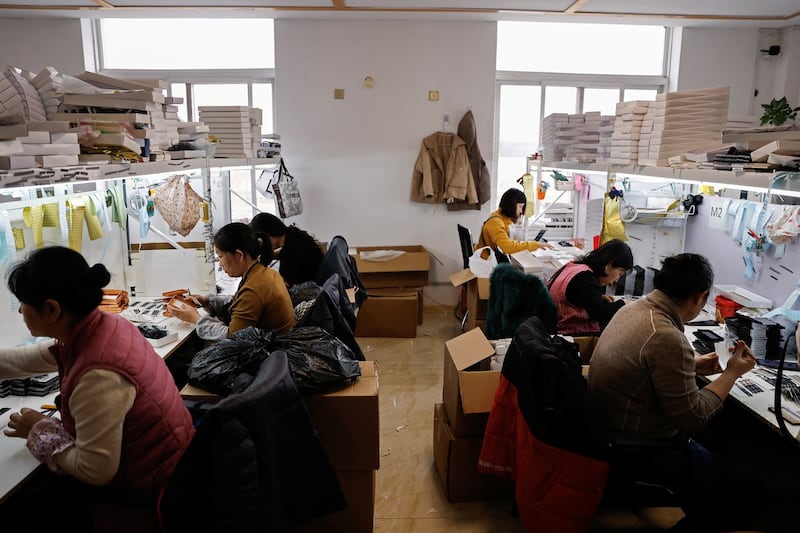They stick on the eyelids and provide more volume than mascara ever could. False eyelashes are big business. But consumers who buy them may be indirectly funding North Korea's missile program.
Though they come in blister packs that say “Made in China,” they may have actually been made in North Korea and shipped to China – in possible violation of sanctions.
A Chinese trader provided Radio Free Asia with a shipping statement showing that a North Korean company based in the border city of Sinuiju last month exported 190,000 false eyelash products to a company in Donggang, a city in China’s Liaoning province.
“North Korean trading companies produce artificial eyelashes using raw materials imported from Chinese companies,” the trader told RFA Korean, insisting on not being identified for fear of punishment. “Then they sell them back to companies in China. North Korean workers receive 1 Chinese yuan (14 U.S. cents) for every three artificial eyelash products they make.”
Through this singular transaction, the state-run North Korean company made 63,000 yuan (US$8,800) in profit for the cash-strapped government, which is trying to develop missiles that would threaten the United States. Washington has in turn slapped sanctions on North Korea to keep it from exporting goods.
The transaction also included 18,000 wigs, which she said takes two or three days to make.
“Some people make more than 100 eyelashes a day,” she said. “The inspection standards are strict and very picky.”
‘Made in China’
The statement and the trader's testimony corroborates a story that Reuters broke last week that fake eyelashes and other beauty products made in North Korea are sent to China and disguised as Chinese products to avoid sanctions.
The products are stamped “Made in China” and exported to the United States, Brazil, Russia and elsewhere, the report said.
Pingdu, in China’s Shandong province, is known as the center of the supply chain for North Korean artificial eyelashes. Reuters reported that this region produces 70% of artificial eyelash production in the world.
According to a 2023 estimate posted on its website by Kali, a Chinese manufacturer of eyelash boxes, about 80% of Pingdu’s artificial eyelash factories purchase or reprocess raw materials and semi-finished artificial eyelash products from North Korea.
The Reuters report said this kind of country-of-origin-laundering operation is being carried out openly in China, and according to Chinese customs data, North Korea exported a total of 1,680 tons of artificial eyelashes, beards and wigs to China last year, worth about US$167 million.
The eyelash business is so lucrative that North Korean workers dispatched by their government to earn foreign cash in China by working in factories there are being given extra eyelash work.
“A seafood company in China that employs North Korean workers is forcing workers to undergo additional eyelash processing,” the trader said. “The workers are complaining.”
The trader said that North Korea even uses prison labor to fill its eyelash contracts.

In June 2019, RFA reported that female prisoners in North Korea were doing additional work of making wigs and eyelashes even after their assigned work
RFA reported in April 2021 that the North Korean government wanted to steer young workers into other industries so there was a labor shortage for eyelash and wig makers that year.
Sanctions violation?
While the North Korean export of eyelashes violates U.S. sanctions against North Korea, they are not subject to U.N. sanctions, Troy Stangarone, at the Washington-based Korea Economic Institute told RFA.
“Technically speaking, the export of eyelashes is not sanctioned under the United Nations,” he said. “What is prohibited is the export of North Korean goods to the United States without a license to import from North Korea.”
“Any fake eyelash products processed in North Korea by Chinese firms would be ineligible to be shipped to the United States,” he said. “So, this is really a difference between U.N. and U.S. sanctions.”
The U.S. firm e.l.f. Cosmetics was fined US$1 million in 2019 after it was discovered that the company had over a period of five years imported eyelashes from China that had North Korean components.
“Ultimately North Korean export of eyelashes or other fake hair products is a small part of their economy and exports,” Stangarone said. “It's unlikely that North Korea will be able to really drive its own economic growth without diversifying into other areas.”
Translated by Claire S. Lee and Leejin J. Chung. Edited by Eugene Whong and Malcolm Foster.
